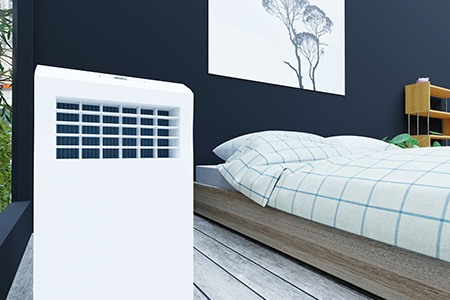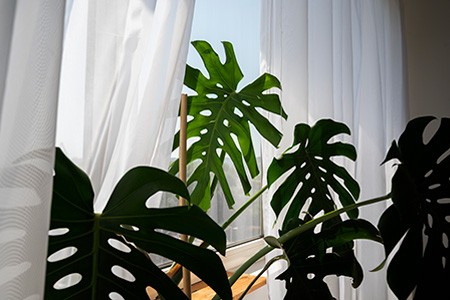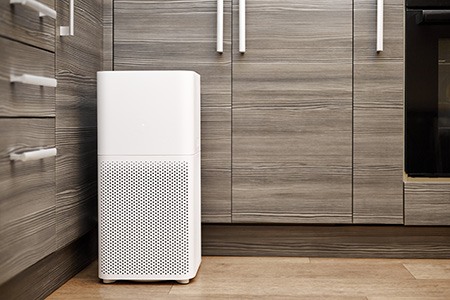7 Disadvantages of a Dehumidifier: Deal Breakers?
Author: Rick Worst | Editor: Omar Alonso
Review & Research: Jen Worst & Chris Miller

Do you have a humid room in your home? A dehumidifier can resolve this issue, pulling the moisture out of the air to return it to a stable and healthy relative humidity. But are there disadvantages of a dehumidifier that might otherwise make you not want to use one?
Humid rooms are a health hazard, providing the ideal breeding grounds for mold and mildew, which cause allergic reactions and respiratory problems.
However, using a dehumidifier unnecessarily could also adversely affect your health and well-being. What are the disadvantages of dehumidifiers, and should you run one in your home? This post gives you everything you need to know about operating this device.
How Does a Dehumidifier Work?

A dehumidifier uses an internal fan to pull air from the room over a set of coils, removing moisture. The warm air passes over the coils, where it cools, leaving the condensation to drain into a storage tank located at the back or bottom of the device.
The dehumidifier then pushes the dry, cool air back into the room. Repeated operation of the unit gradually pulls the moisture out of the air, with noticeable effects occurring within a few minutes of operation. You'll have to match the unit's capacity to the room size for effective operation, or it won't work effectively.
The device runs automatically, using sensors to detect when the incoming air reaches the desired relative humidity (RH) level. Typically, a room should be between 30% to 50% RH for healthy living quarters.
What are the Disadvantages of a Dehumidifier?
While a dehumidifier has several advantages, especially in rooms with RH and humid environments, such as the coastline, it also has a bunch of disadvantages. Let's look into them in detail.
Dehumidifiers are Noisy
Dehumidifiers operate using a fan to pull air into the unit, which cools and removes moisture before expelling it into the room. However, some larger models are quite noisy, producing between 35 dB to 65 dB and even a bit higher as they hum along.
If you're operating the dehumidifier in a bedroom, the hum of the device might keep you awake at night or it might act as white noise and help, depending on you as an individual. It might interrupt your sleep and lessen its quality and therapeutic effects on your mind and body.
If you're running a dehumidifier in your bedroom, we recommend going for a "desiccant" model. These units operate quietly, and you shouldn't have much interference with your sleep.
Dehumidifiers are Expensive to Run
Dehumidifiers are expensive devices to purchase, and they also consume a decent amount of electricity, driving up your energy expenses. Most people leave their dehumidifier to run 24 hours a day, which becomes costly.
There are energy-efficient models available, but they cost significantly more to purchase. However, you'll recover these additional costs in the energy savings the device creates during its service life. The other option is to connect the device to a timer.
Typically, humid areas experience high rates of RH during the day and lower RH at night. So, it might not be necessary to leave the unit running 24/7.
Dehumidifiers Aggravate Respiratory Issues

One of the primary roles of a dehumidifier is to remove moisture from the air that creates mold infestation, leading to respiratory problems. However, removing too much moisture from the air has a similar effect. The ideal RH for a room is between 50 to 55%.
Going lower than this threshold creates a dry-air environment, resulting in issues for people suffering from allergies and asthma. Too much humidity from a humidifier or humidifier alternative can have a similar effect from the opposite cause.
Dry air cracks your lips, makes your throat itch and irritates your sinuses. Dry air also makes the environment hospitable for spreading bacteria and viruses, and these pathogens will make you sick.
Dehumidifiers Can Create Heat
If you run a desiccant dehumidifier, it may expel warmer air into the room rather than cool it down. In some models, the air coming out of the device is up to 50°F warmer than the air entering the unit.
If you have a cold home, it serves the task of warming it up, but if your home is already warm, it might make the living space uncomfortable. This is a huge disadvantages of a dehumidifier.
For homeowners living in a warm region of the country, it's better to go with a compressor-operated model, even if it consumes more energy.
Dehumidifiers Require Extensive Maintenance
Dehumidifiers pull the moisture out of the air, draining it into a storage tank at the back or base of the unit. You'll need to empty the tank every other day, depending on how long you operate the unit each day and the room humidity level.
Some models come with a built-in drainage hose which you can feed outside to remove the need for this task. Over time, the water running through the device accumulates debris in the filters. You'll need to clean them once every few months to prevent a damp smell from emitting from the device.
Dehumidifiers Promote Mildew & Mold Growth

Most people assume that a dehumidifier removes moisture from the air, making it impossible for mold and mildew to enter the room and spread. However, the filters and water tank present ideal breeding grounds for these pathogens.
You'll need to empty the water tank regularly and keep it clean. When cleaning out the tank, you'll notice that a film builds on its walls. Make sure you scrub it away.
Dehumidifiers Present a Fire Hazard
Dehumidifiers are electrical devices that pull moisture from the air in the room. Any electrician can tell you water and electricity don't mix. So, your dehumidifier can present an electrical risk and fire hazard to your home if you don't use it properly.
The water tank on most models is usually positioned next to the unit's coils and other electrical components. If the water becomes overly hot due to a malfunctioning coil, it might spill onto the other unprotected electrical components in the unit, starting an electrical fire.
Ensure you empty the storage tank regularly to prevent inefficient operation and remove the threat of starting an electrical in your home. Never leave the unit unattended when you aren't home. Unplug it from the wall to ensure it stays off while you're away.
Dehumidifier Alternatives

As you can see, there are several disadvantages of a dehumidifier that can worsen your comfort in the home while attempting to do the opposite. However, most of them are easy enough to manage with the right care and maintenance of the unit.
The benefits of the device outweigh the cons, but homeowners need to adhere to the correct operating procedures for the device. Study the owner's operating manual before using the unit for the first time.
We recommend purchasing a premium model for your home, as there's less chance of it malfunctioning and causing problems. Also, remember to size the unit to your room correctly, or it results in an inefficient operation that wastes electricity and doesn't cool the room properly.
If you don't want to bother with the expense and risk of running a dehumidifier in your home, try these tips to keep moisture out of the air.
Ventilate the Room Properly
Ensuring the room has adequate ventilation helps to remove moisture from the air. For instance, some basements might have a water heater running or drains that increase the RH in the room. Open all the windows to allow fresh air into the room and dry out the moisture. The same goes for ventilating your garage.
However, live in a humid area where the air outside has a high RH, such as the coastline. This strategy might not make much of a difference. A dehumidifier will be the only option for removing the moisture from the air and returning your home to a comfortable RH.
Take Damp Objects Out of the Room
Leaving wet towels or clothing in the room increases the RH when water evaporates from the fabric. Don't leave damp clothing or materials around; place them in the laundry basket or the dryer. Don't hang damp clothes in your closet and expect to get the moisture out of the closet with a dehumidifier either. Just dry everything appropriately.
Grow Plants That Can Reduce Humidity
You can have certain potted plants indoors (as long as they get sufficient light) that can help reduce humidity in the home without overdoing it. Some plants that reduce humidity include aloe vera, orchids, boston ferns, spider plants, devil's ivy, palms, and more.
FAQs Concerning the Disadvantages of a Dehumidifier

Whenever we talk about the unwanted side-effects of a dehumidifier like above, a handful of other questions come up, like “can a dehumidifier make you sick?” Let’s take a look at all these questions you may have in mind so we can put them to rest.
Can I Sleep With a Dehumidifier Running?
No. Sleeping with the dehumidifier running all night is not a good idea. While it might make the room conditions more comfortable, it presents an electrical risk. However, many homeowners that purchase these devices choose to leave them on anyway to benefit from the improved air quality provided by the device.
Can a Dehumidifier Make You Sick?
The aim of running a dehumidifier is to improve the air quality in the room. Excessive moisture in a space, especially a bedroom, causes the growth of fungal and bacterial pathogens, like mildew and mold. Black mold spores are highly toxic and affect both the respiratory and nervous systems.
However, running the dehumidifier for too long removes too much moisture from the air. We need a certain level of RH in the room; overly dry air will also adversely impact your health. Most dehumidifier models come with built-in timers, allowing you to set them up for optimal operating conditions.
Will Running a Dehumidifier Dehydrate Me?
No. It's almost impossible for a dehumidifier to dehydrate you. However, running a desiccant model in your room might increase the air temperature, causing you to sweat more while you sleep. As a result, your body loses fluids and minerals, increasing levels of dehydration.
However, it's unlikely that the unit will cause such a big chance in the environment that it severely dehydrates you to the point of risking your health.
Those Are the Disadvantages of a Dehumidifier
Yes, there are at least seven disadvantages of a dehumidifier. We detailed them above. But that doesn’t necessarily mean you shouldn’t use one, especially if you know you have a humidity problem placing expensive items in your home at risk of warping and rusting. Consider your own personal situation and decide what is best for you.



